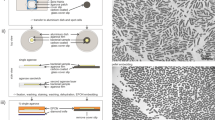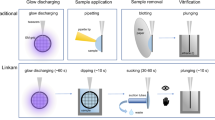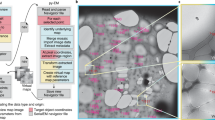Abstract
THE preparation of biological material for examination in the scanning reflexion electron microscope frequently involves coating the specimen with evaporated metal. With a small, conventional vacuum coating unit it is often difficult to achieve an adequate coating without damaging the specimen by radiation from the metal source. The technique of Lingappa and Lockwood1 which has been used in this laboratory for the observation, by light microscopy, of mycelia and stomata, has been modified and successfully applied to overcome this problem.
This is a preview of subscription content, access via your institution
Access options
Subscribe to this journal
Receive 51 print issues and online access
$199.00 per year
only $3.90 per issue
Buy this article
- Purchase on Springer Link
- Instant access to full article PDF
Prices may be subject to local taxes which are calculated during checkout
Similar content being viewed by others
References
Lingappa, B. T., and Lockwood, J. L., Phytopathol., 53, 529 (1963).
Author information
Authors and Affiliations
Rights and permissions
About this article
Cite this article
CHAPMAN, B. Polystyrene Replicas for Scanning Reflexion Electron Microscopy. Nature 216, 1347–1348 (1967). https://doi.org/10.1038/2161347a0
Received:
Issue Date:
DOI: https://doi.org/10.1038/2161347a0
Comments
By submitting a comment you agree to abide by our Terms and Community Guidelines. If you find something abusive or that does not comply with our terms or guidelines please flag it as inappropriate.



